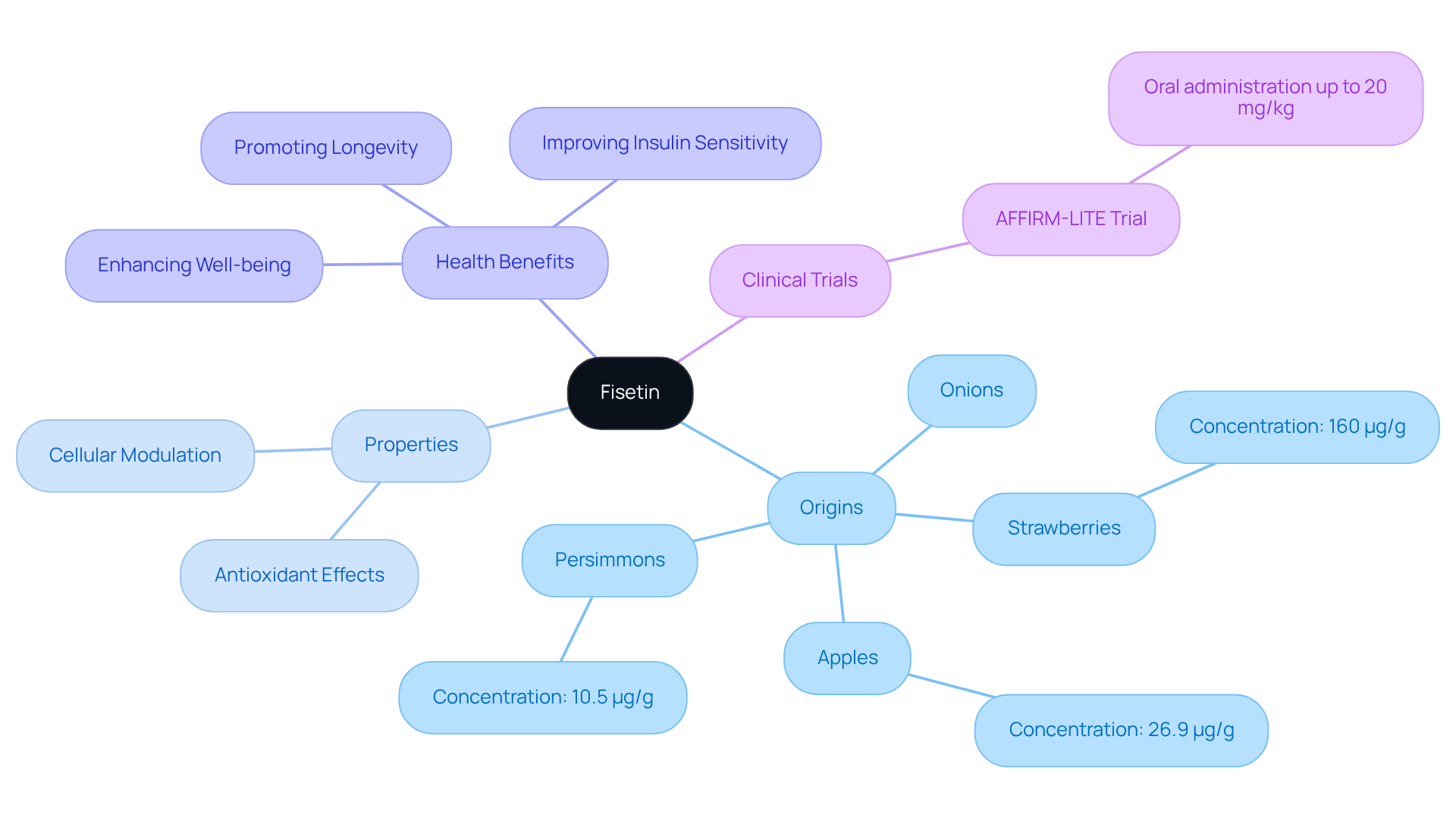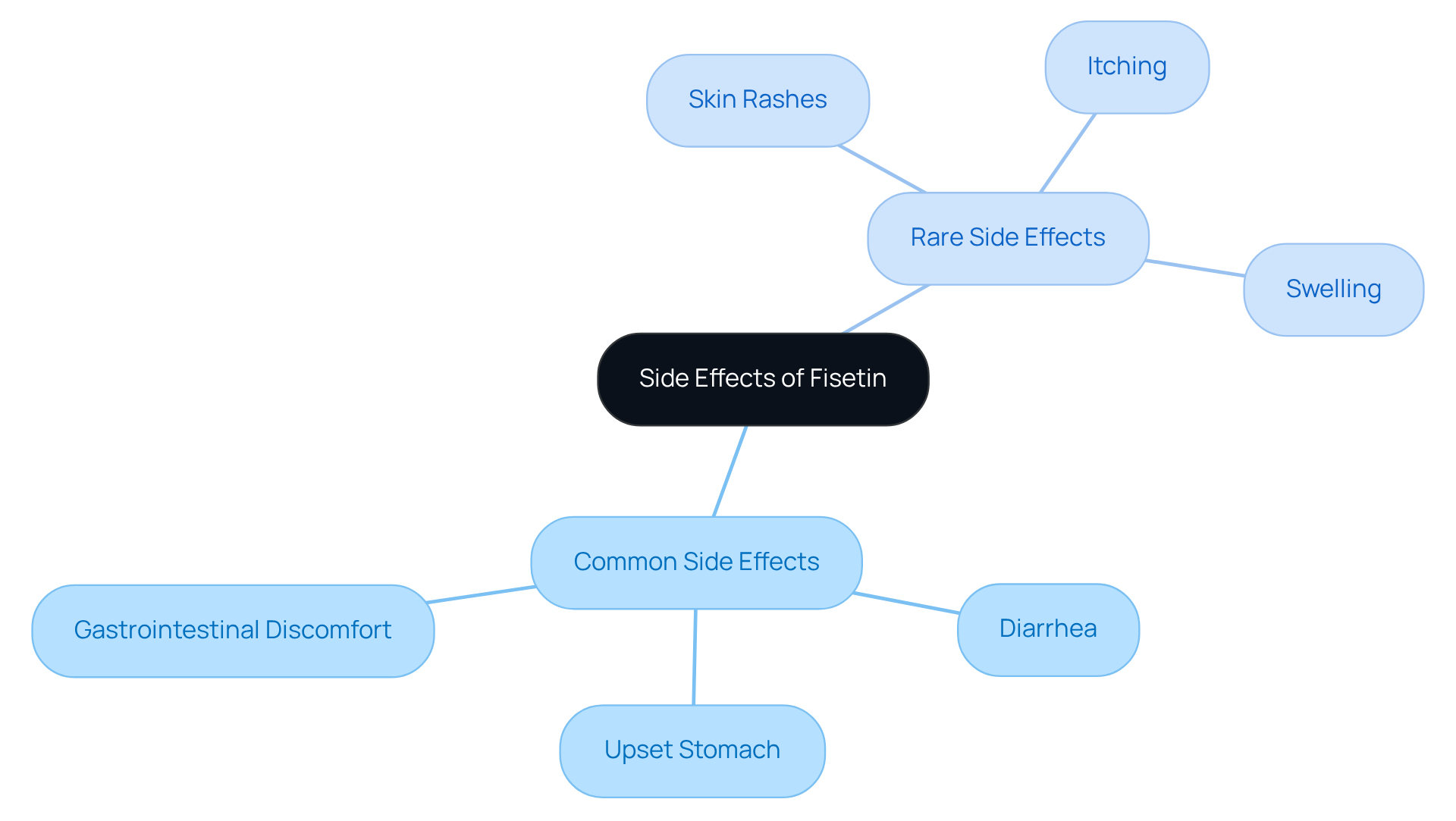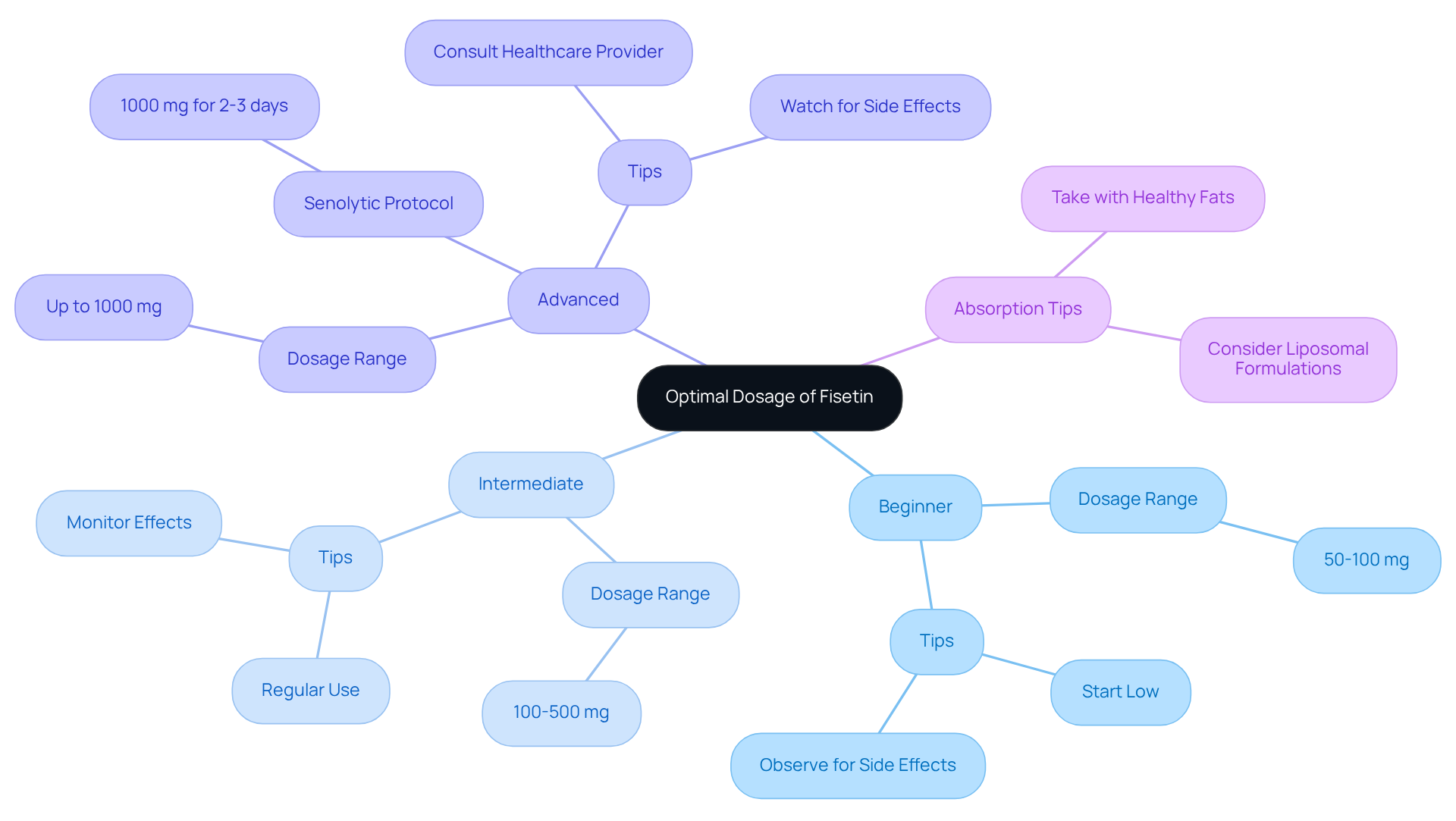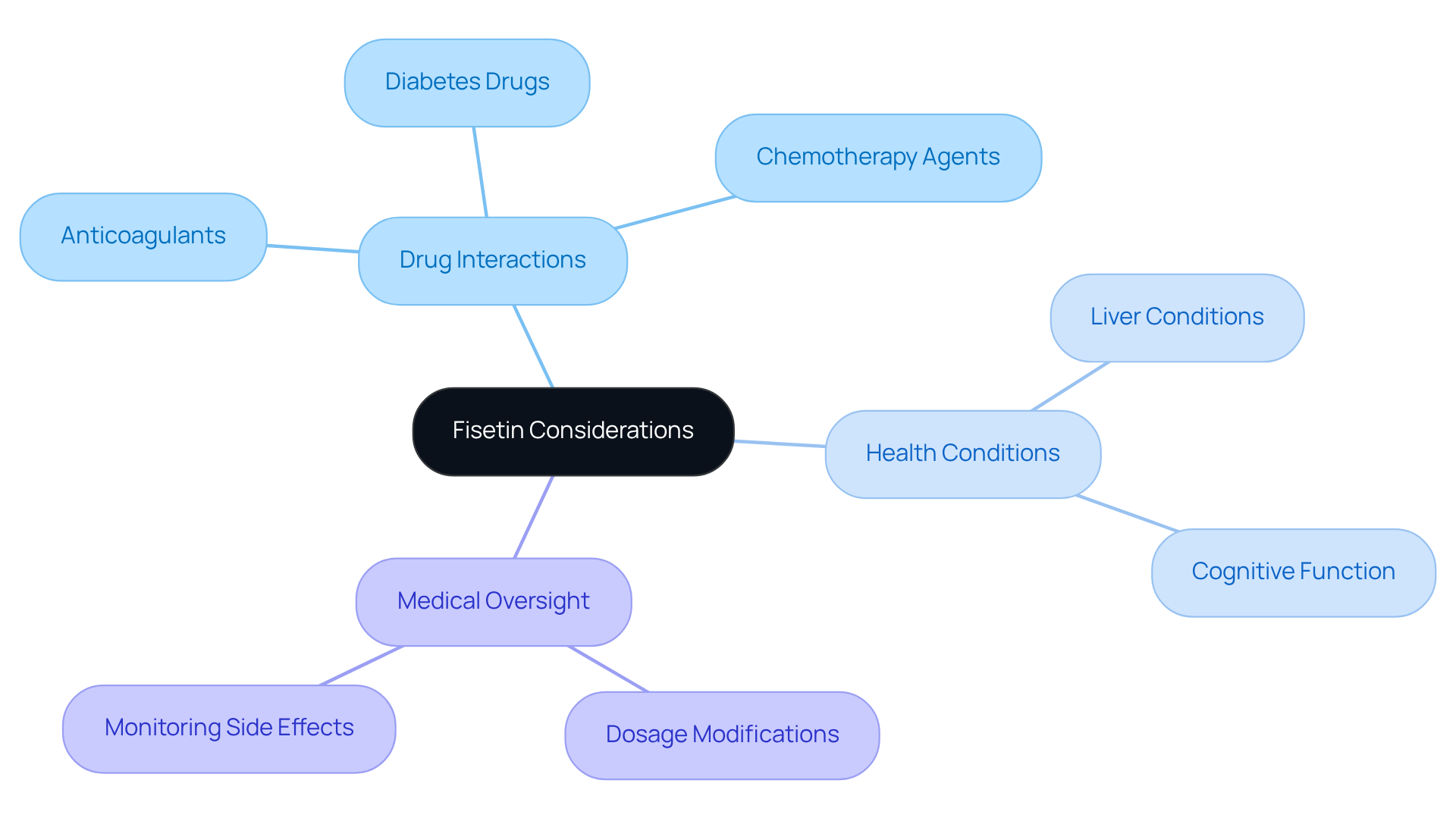Fisetin Side Effects: Understanding Risks and Dosage for Safety
Overview
This article explores the side effects, risks, and recommended dosages of fisetin, a flavonoid recognized for its antioxidant properties and potential health benefits. While fisetin is generally well-tolerated, some individuals may experience mild gastrointestinal discomfort or allergic reactions. Therefore, it is crucial to consult healthcare providers for safe usage, particularly when considering higher doses or if taking certain medications. Understanding these aspects can help individuals make informed decisions regarding fisetin supplementation.
Introduction
The increasing interest in natural compounds for health and longevity has spotlighted fisetin, a flavonoid present in fruits such as strawberries and apples. Renowned for its antioxidant properties, fisetin is under investigation for its potential to enhance well-being and combat aging. However, understanding the associated risks, side effects, and optimal dosages is essential for safe consumption.
What precautions should individuals consider to harness the benefits of fisetin while minimizing potential adverse effects?
Define Fisetin: Origins and Properties
3,3′,4′,7-tetrahydroxyflavone, a naturally occurring flavonoid, is predominantly found in a variety of fruits and vegetables, including strawberries, apples, persimmons, and onions. Notably, strawberries contain 160 μg/g of this compound, making them one of the richest dietary sources. As a member of the flavonol group of polyphenols, this compound is celebrated for its potent antioxidant properties.
Recent scientific studies have highlighted its significant role in modulating cellular processes, which is crucial for combating oxidative stress—a key factor in aging. This has established a central aspect in anti-aging research. What are the possible advantages? They include:
- Promoting longevity
- Enhancing overall well-being
- Improving insulin sensitivity and blood sugar regulation
All of which are actively being investigated.
The compound’s ability to influence biological pathways associated with aging underscores its importance in the quest for effective anti-aging strategies. Furthermore, ongoing clinical trials, such as the AFFIRM-LITE trial, are exploring the effects of this compound when administered orally in amounts up to 20 mg per kilogram of patient body weight, emphasizing its potential uses in health management.

Identify Common and Rare Side Effects of Fisetin
Fisetin is generally well-tolerated, although some individuals may encounter mild side effects, especially at higher doses. Commonly reported issues include:
- Gastrointestinal discomfort, such as nausea
- Diarrhea
- Upset stomach
Research indicates that these symptoms can occur more frequently with increased intake, emphasizing the importance of moderation.
In rare cases, allergic reactions may manifest as:
- Skin rashes
- Itching
- Swelling
While this compound is considered safe for most, individuals on anticoagulant medications should exercise caution, as it may enhance their effects, potentially increasing the risk of bleeding. Consulting a healthcare provider is advisable for those concerned about potential interactions or side effects. By staying informed and cautious, you can enjoy the benefits of Fisetin while minimizing risks.

Determine Optimal Dosage and Administration of Fisetin
The suggested amount of the compound typically ranges from 50 to 1000 mg daily, customized to personal wellness goals and circumstances. For those unfamiliar with this compound, beginning with a dosage of 50 to 100 mg is recommended, allowing for gradual increases while observing for any fisetin side effects. Intermediate users may find a range of 100 to 500 mg effective for general wellness. In contrast, advanced users can consider amounts up to 1000 mg for specific health advantages, such as inflammation reduction and improved cellular health.
Research indicates that taking fisetin with healthy fats can significantly improve its absorption. Therefore, it is beneficial to consume it alongside meals containing sources of fat. Additionally, for targeted anti-aging effects, a senolytic protocol suggests a minimum of 1000 mg for 2-3 consecutive days each month. It is crucial to mention that human research has utilized amounts reaching 1,400 mg daily for 3 days without significant adverse effects.
Consulting with a healthcare provider is recommended, especially for those considering doses above 500 mg per day, those taking blood thinners, or those with underlying health conditions. High doses may lead to fisetin side effects, including mild gastrointestinal discomfort, so professional guidance is essential.

Evaluate Drug Interactions and Health Considerations
This compound has the potential to interact with various medications, notably anticoagulants, diabetes drugs, and certain chemotherapy agents. Individuals on these medications must consult a healthcare provider before starting the supplement to avoid fisetin side effects and other adverse interactions.
Fisetin is recognized for its antioxidant properties and its role in supporting healthy aging and cognitive function. This makes it essential for individuals considering its use. For those with liver conditions, caution is recommended due to the potential fisetin side effects, as this compound may affect liver enzyme activity and potentially exacerbate existing medical concerns.
Routine oversight by medical experts is crucial for modifying dosages and observing any fisetin side effects, especially for individuals contemplating amounts exceeding 500 mg/day. This proactive approach not only mitigates risks but also supports optimal health outcomes for individuals considering fisetin as part of their wellness regimen.

Conclusion
Fisetin, a naturally occurring flavonoid found in various fruits and vegetables, holds significant promise in the realm of health and wellness, particularly in anti-aging research. Understanding its benefits, potential side effects, and proper dosage is crucial for anyone considering its use. This article has delved into the origins of fisetin, its antioxidant properties, and how it may promote longevity and improve overall well-being while also addressing the importance of moderation and caution in its consumption.
Key insights include the identification of common and rare side effects, such as gastrointestinal discomfort and allergic reactions, which can arise from higher dosages. The recommended dosage varies, with an initial intake of 50 to 100 mg suggested for beginners, while more experienced users may opt for higher amounts to target specific health benefits. Furthermore, the potential for drug interactions emphasizes the need for individuals, especially those on anticoagulants or with underlying health conditions, to consult healthcare providers before starting fisetin supplementation.
In summary, the exploration of fisetin underscores its potential as a valuable addition to health regimens, particularly for those interested in its anti-aging effects. As research continues to unfold, staying informed about the appropriate use and safety considerations is essential. Embracing a cautious approach not only maximizes the benefits of fisetin but also ensures a safer experience in the pursuit of enhanced health and longevity.
Frequently Asked Questions
What is Fisetin?
Fisetin, also known as 3,3′,4′,7-tetrahydroxyflavone, is a naturally occurring flavonoid found in various fruits and vegetables, including strawberries, apples, persimmons, and onions.
Which fruit is the richest source of Fisetin?
Strawberries are one of the richest dietary sources of Fisetin, containing 160 μg/g of this compound.
What are the notable properties of Fisetin?
Fisetin is celebrated for its potent antioxidant properties and its role in modulating cellular processes, which is crucial for combating oxidative stress.
How is Fisetin related to anti-aging research?
Fisetin’s ability to influence biological pathways associated with aging has established it as a significant focus in anti-aging research, particularly in promoting longevity and enhancing overall well-being.
What potential health benefits are being investigated for Fisetin?
The potential benefits of Fisetin being investigated include promoting longevity, enhancing overall well-being, and improving insulin sensitivity and blood sugar regulation.
Are there any ongoing clinical trials involving Fisetin?
Yes, ongoing clinical trials, such as the AFFIRM-LITE trial, are exploring the effects of Fisetin when administered orally in amounts up to 20 mg per kilogram of patient body weight.






